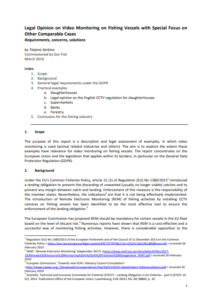A report called ‘Legal Opinion on Video Monitoring on Fishing Vessels with Special Focus on Other Comparable Cases’ was published on March 7, showing that the use of video monitoring, or Remote Electronic Monitoring (REM), can be used on board EU fishing vessels to ensure proper catch reporting, and end illegal discarding of fish.
The report, commissioned by Our Fish, indicates that while there are concerns regarding REM, they should not lead to lack of action. As a matter of fact, other sectors are also dealing with the same challenges, showing that it is possible to have effective monitoring while also conforming to data protection requirements.
[smlsubform prepend=”GET THE SAFETY4SEA IN YOUR INBOX!” showname=false emailtxt=”” emailholder=”Enter your email address” showsubmit=true submittxt=”Submit” jsthanks=false thankyou=”Thank you for subscribing to our mailing list”]
The EU’s ban on discarding dead or dying fish back into the sea, known as the Landing Obligation (LO), was part of the 2013 reform of the Common Fisheries Policy. It aims to end discarding and lead to change in fishing practices, such as avoid catching unwanted and non-valuable fish, give incentives for improvements in selectivity, count everything that is caught, and promote ecosystem-based management.
However, the European Fisheries Control Agency (EFCA) has assessed that most of fishing activities using active gears are still at risk of discarding, and conducting illegal and unreported fishing. For this reason, the European Commission is proposing to use a review of its Control Regulation to introduce Remote Electronic Monitoring (REM). Nonetheless, concerns have been raised regarding privacy and data protection.
The new report notes that legal analysis demonstrates that privacy and data protection are not barriers to video monitoring of fishing. Programming and video technology can avoid damaging privacy and personal data, as vessel operators can own the footage, and governments and scientists can use the data to audit records to have a better knowledge of catches, fish stocks, and achieve better fisheries management.
Rebecca Hubbard, Program Director of Our Fish, highlighted:
It is essential that EU decision-makers take a solutions-based approach to implementing onboard video monitoring, so that we put an end to widespread illegal, unreported fishing, which undermines ocean health, consumer trust and the industry.
In order for video monitoring on board fishing vessels to comply with the Landing Obligation and to fully document fisheries, the report recommends that legislators and operators should consider the following:
- CCTV surveillance of risk groups: When there is cause to suspect non-compliance with legal requirements, temporary monitoring of the fishing activities would be appropriate.
- Avoiding personal data: Monitoring only the technical process without making individuals identifiable. This would also mean the GDPR would not apply [2].
- Anonymisation: Monitoring the entire process and pixelating any recorded persons in such a way that identification is not possible.
- Data minimisation: Limit the video monitoring to a minimum time i.e during landing, sorting and processing the catch.
- Data ownership and review: Vessel operators may be the owners of the footage, the review conducted by a third party, and the resulting data provided to governments for auditing purposes of catches and landings. This audited data could also be shared with other interested or relevant parties such as scientists.
See more information in the PDF herebelow
































































